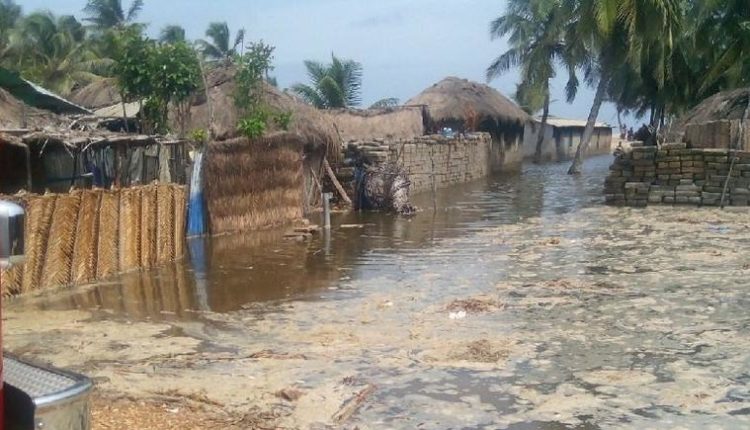Strong tidal waves flooded the Keta Municipality in the Volta Region early Sunday morning and left some 3000 plus residents, including women and children stranded, displaced and homeless.
The sea water also destroyed properties, farmlands and poultry farms. In many cases residents could not save any property or household item.
The Keta Municipal Chief Executive (MCE), Emmanuel Gemegah, has called for help and said though the has been years of attempts to save the community from such disasters, there is still a lot of work to be done.
“We are pleading with the government for immediate support for the affected residents,” the MCE noted.
Mr. Gemegah, together with the Municipal Engineer and officials of the National Disaster Management Organisation (NADMO), toured the affected communities such as Abutiakope, Kedzikope and Keta Central on Sunday to ascertain the extent of damage and losses.
Residents said they went to bed Saturday night and woke up Sunday dawn to the shock of the tidal waves sweeping their entire community.
They say they have nowhere to relocate to.
More Trouble
Citi News reports that the waves further affected residents living in some communities along the Keta – Aflao stretch including places like Salakope and Amutinu being the hardest hit.
The residents who spoke to Citi News say they are in between the sea and the lagoon.
“There is no place to relocate the people to. The banks of the lagoon would’ve been the safest but that has also flooded as the sea rises” the Assembly Member for Agavedzi Electoral Area said to Citi News’ Fred Duhoe.
According to the Assembly Member, Ebenezer Assah, if the situation is not addressed by the government in time, the sea will split the road and cause greater havoc to residents.
It said the Director of the Institute for Environment and Sanitation Studies at the University of Ghana, Prof. Kwesi Appeaning Addo said the government must invest in scientific research in a bid to find ways of reducing the impact of tidal waves and coastal erosion within communities along the coast.
In a Citi News interview, Prof. Appeaning Addo indicated that one solution cannot reduce the impact in all affected communities, hence the need for research into the issue.


Comments are closed.